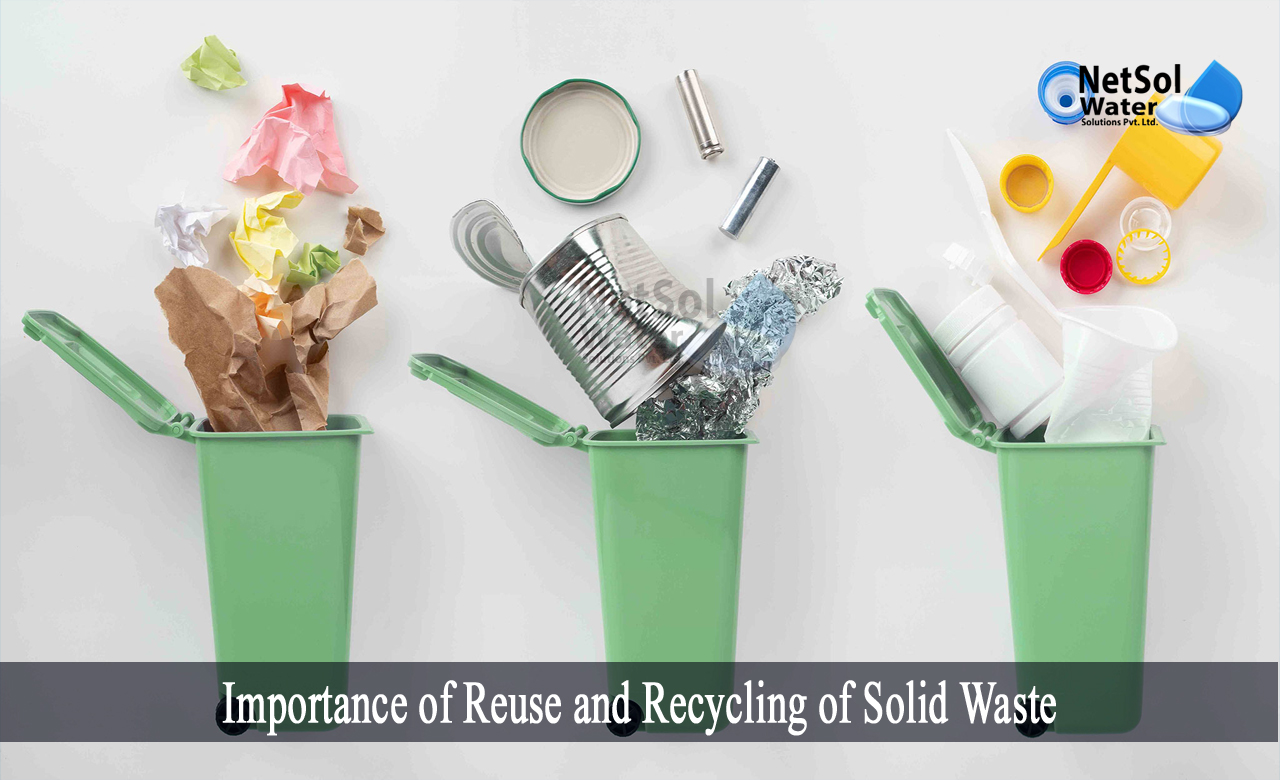What are the Importance of Reuse and Recycling of Solid Waste?
Recycling, often known as resource recovery, is the process of reusing previously used but discarded materials. Plastic bags, tins, glass, and containers are frequently recycled, since they are frequently likely to be in short supply.
Before being recycled, these products are often treated and cleaned. The procedure seeks to decrease energy waste, fresh material consumption, and landfill usage.
In this article, we will learn about the importance of reusing and recycling of solid wastes.
What is recycling?
Recycling is the process of identifying parts of solid waste that may still be useful economically, and recovering them for reuse. Recovering and using thermal energy is one sort of recycling. Since, composting recovers the organic components of solid waste for reuse, as mulch or soil conditioner, it can also be viewed as a recycling process.
Process of recycling of solid wastes
Firstly, any material that is to be recycled must first be processed and separated, from the raw waste. Separation may be carried out at the waste's origin or at a centralized processing plant. Curbside separation, also known as source separation, is carried out by private persons, who separate newspapers, bottles, cans, etc. before setting them out for collection.
Secondly, recycling materials must be separated at centralized mechanical processing facilities, in place of source separation. Experience has shown that contamination with wet waste and broken glass lowers the quality of recyclables, recovered from these facilities. The optimum method, as it is presently understood, is to have people divide this waste into a small number of categories, such as garbage, non-recyclables, magazines and other wastepaper, mixed metals, glass, plastics, and newspapers.
Lastly,recyclables are put onto a conveyor at a typical MRF. An electromagnetic separator removes steel, and the remaining material is then sent over a vibrating screen to remove shattered glass.
Aluminium, plastic, and lighter glass containers are separated from each other, on the conveyor using an air classifier.
Aluminium cans are separated from plastics by an eddy-current separator, which repels the aluminium from the conveyor belt, and glass is manually sorted by colour.
Reuse of solid waste
Reuse of glass:Broken glass that has been recovered can be crushed and utilized in asphalt paving’s. Crushed colour-sorted glass can be sold to glass producers as cullet, a crucial component in the production of glass.
Reuse of aluminium:Aluminium is baled or compacted for use by smelters, and steel cans are baled and transported to steel mills as scrap. Although, it makes up a modest portion of municipal solid waste, aluminium is the most valuable recyclable commodity.
Reuse of plastics:Due to the numerous distinct polymeric components used in its creation, recycling plastic is difficult. Mixed thermoplastics can only be used to create inferior goods like, plastic timber.
Reuse of newspapers:Old newspapers are manually sorted on a conveyor belt in the paper stream, to eliminate corrugated debris and mixed papers. They are then put loosely or in bales into trailers, for transport to paper factories, where they are recycled to create new newspapers. For sale to tissue manufacturers, mixed paper is separated from corrugated paper.
Reuse of paper:Despite the fact that pulping, de-inking, and screening wastepaper normally costs more, than producing paper from raw wood fibres, the market for recycled paper has expanded as more processing facilities have been built.
Reuse of rubber:Revulcanization is a technique for recovering rubber from solid waste; however, the recycled rubber is typically not as durable as the original. Rubber can be directly sold as outdoor mulch, or utilized as a component in artificial turf and asphalt paving. In "tyre playgrounds," used tyres can be transformed into swings and other play equipment for kids.
Conclusion
Finding uses and viable markets is, in general, the most difficult issue related to the recycling of any solid-waste resource. Recycling by itself won't be sufficient to address the growing issue, of managing and disposing of solid waste. There will always be some solid waste that is absolutely useless, and needs to be disposed of.
In conclusion, effective solid waste management is a crucial aspect of environmental preservation, which should be followed by both individuals and businesses around the world.
How can we assist?
The system designers at Netsol Water will be able to assess, all input and output needs for the client, and select the most efficient, practical, modern and sustainable solid waste management technique, for municipalities, residential areas, commercial areas, as well as industries. We can also ensure sustainable methods of solid waste collection and disposal, along with proper recycle and reuse.
Netsol Water is Greater Noida-based leading water & wastewater treatment plant manufacturer. We are industry's most demanding company based on client review and work quality. We are known as best commercial RO plant manufacturers, industrial RO plant manufacturer, sewage treatment plant manufacturer, Water Softener Plant Manufacturers and effluent treatment plant manufacturers. Apart from this 24x7 customer support is our USP. Call on +91-9650608473, or write us at enquiry@netsolwater.com for any support, inquiry or product-purchase related query.



